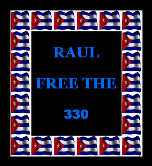No Man Is An Island
Ignacio Ramonet is right that public protests haven’t erupted in Cuba since Fidel Castro handed power to his brother last year (“Was Fidel Good for Cuba?” January/ February 2007). But that isn’t because Cubans don’t want change. It’s because Castro’s repressive machinery remains fully intact. Cubans know what they can expect when they call for change: surveillance, harassment, mob violence, loss of employment, enforced separation from family abroad, and prison. Ramonet is also right that Castro’s Cuba has made important progress in education and healthcare. But he’s wrong to suggest that these advances justify the systematic denial of fundamental freedoms. A high literacy rate doesn’t justify punishing people, as Cuba does, for what they write. A low infant- mortality rate doesn’t justify holding doctors hostage on the island, as Cuba does, denying them permission to visit relatives abroad on the grounds that their brains are “government property.” Ramonet is right that the U.S. embargo on Cuba has been an unmitigated failure. The embargo has hurt ordinary Cubans and only benefited Castro’s government, providing it with an excuse for its problems and a pretext for its abuses. Washington’s heavy-handed policies have allowed Castro to play the part of a Latin American David standing up to the American Goliath, a role he exploits brilliantly to win supporters abroad. Take
Ramonet himself, for example. Here is a leading European journalist actually defending a government that for decades has denied its citizens the right to practice his own profession: independent journalism. Carlos Alberto Montaner, meanwhile, is too optimistic in his prediction for Cuba. It will take more than Castro’s death to bring change to the island. Even an end to the U.S. embargo will not be enough. What’s needed now, more than ever, is a measured and multilateral effort by the international community aimed at pressing Cuba to respect the basic freedoms it has denied its people for so long.
—José Miguel VivancoExecutive Director,Americas DivisionHuman RightsWatchWashington, D.C.
—Daniel WilkinsonDeputy Director,Americas DivisionHuman Rights WatchWashington, D.C.
I’m a Cuban Gump, you know, not a very smart man.
But certain things are obvious even to me.
What is wrong with a World where there’s actually a debate on whether Totalitarianism is good?
Have we totally lost all concept of Good and Evil, Right and Wrong, Justice and Injustice?
Freedom, Rights, Elections are not just words. They are concrete concepts that can be objectively measured. We all know what they are. They are not relative debating points. They either exist or they don’t AND they don’t exist in Cuba.
And, asking whether a system that denies human beings Freedom, Rights and Elections is good for a country is stupid.
Stupid is as Stupid does.







6 comments:
Gusano, you point out with sniper precission all the doublesided morals of those who defend kasstro from the comfortable nest that is a free country.
HAHAHA Jose. Thanks man I needed a good laugh. Estoy enfogonao. Then Charlie here got me even more steemed up at Killcastro blog.
CB:
i'm telling you its almost like we're not real human beings worthy of human rights. it's ok for us brown , little people to give up our rights to be able to read what they want us to read and go to the doctor they choose for us because its what's good for us.
they debate about our rights as if we weren't in the room , like we're children.
no need to debate.
just e-mail a Cuban and ask them.
Well, wait you can't.
ok,read a Cuban and editorial in a Cuban newspaper.Wait, that's government controlled.
Call a Cuban on the phone.
oh, they don't have phones. and those that do are monitored.
ok,invite a Cuban to write an article.
oh, wait...that's illegal.
e-mail..forget it.
funny how this 'debate' has to happen outside of Cuba.
Interesting how Human Rights Watch condemns the "embargo" but ends by stating that a multilateral effort by the international community aimed at pressing Cuba to respect basic freedoms is needed.
I wonder what this multilateral effort would consist of. Sanctions? Or just another slap in the hands?
Robert:
yes.Interesting.
hopefully mmany nations will refuse to recognize the Raul gvt.
simlar to what the int'l community did to Hamas in palestine.
a real "embargo"
only this one will be "multilateral" and they'll all be able to take credit after 48 yars of enabling (sp), while the US went at it alone.
Post a Comment